
Kentucky, officially the Commonwealth of Kentucky, is a state in the Southeastern region of the United States and one of the states of the Upper South. Kentucky borders Illinois, Indiana, and Ohio to the north, West Virginia to the northeast, Virginia to the east, Tennessee to the south, and Missouri to the west. Its northern border is defined by the Ohio River. Its capital is Frankfort and its largest city is Louisville. Its population was approximately 4.5 million in 2020.

Ashley Judd is an American actress. She grew up in a family of performing artists, the daughter of country music singer Naomi Judd and the half-sister of country music singer Wynonna Judd. Her acting career has spanned more than three decades, and she has become heavily involved in global humanitarian efforts and political activism.

Webster County is a county located in the U.S. state of Kentucky. As of the 2020 census, the population was 13,017. Its county seat is Dixon and its largest city is Providence. It is the southernmost county in the Evansville, IN–KY Metropolitan Statistical Area. The county was formed in 1860 from parts of Henderson, Hopkins, and Union Counties and named for American statesman Daniel Webster (1782-1852). It was mainly pro-Confederate during the American Civil War and was the site of several skirmishes and some guerrilla warfare. Since 2018 it has been a moist county, with Providence and Sebree voting to allow alcohol sales, and Clay doing so in 2022.

Union County is a county in the U.S. state of Kentucky. As of the 2020 census, the population was 13,668. Its county seat is Morganfield. The county was created effective January 15, 1811.
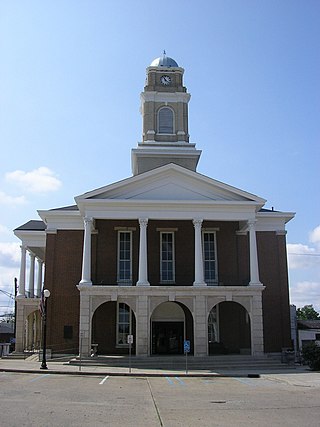
Garrard County is a county located east-central Kentucky. As of the 2020 census, the county's population was 16,953. Its county seat is Lancaster. The county was formed in 1796 and was named for James Garrard, Governor of Kentucky from 1796 to 1804. It is a prohibition or dry county, although its county seat, Lancaster, is wet. Lancaster was founded as a collection of log cabins in 1776 near a spring that later provided a constant source of water to early pioneers. It is one of the oldest cities in the Commonwealth. Boonesborough, 25 miles to the east, was founded by Daniel Boone in 1775. Lexington, 28 miles to the north, was founded in 1775. Stanford, originally known as St. Asaph, is 10 miles south of Lancaster. It too was founded in 1775. The oldest permanent settlement in Kentucky, Harrodsburg, was founded in 1774 and is 18 miles to the west. Garrard's present day courthouse is one of the oldest courthouses in Kentucky in continuous use.

Richmond is a home rule-class city in and the county seat of Madison County, Kentucky, United States. It is named after Richmond, Virginia, and is home to Eastern Kentucky University. The population was 34,585 at the 2020 census. Richmond is the fourth-largest city in the Bluegrass region and the state's seventh-largest city. It is the ninth largest population center in the state with a Micropolitan population of 106,864. The city serves as the center for work and shopping for south-central Kentucky. In addition, Richmond is the principal city of the Richmond-Berea, Kentucky Micropolitan Area, which includes all of Madison and Rockcastle counties.
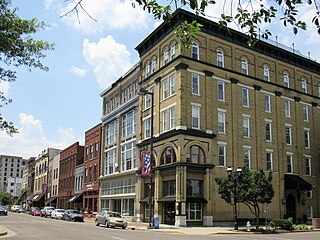
Paducah is a home rule-class city in and the county seat of McCracken County, Kentucky, United States. The largest city in the Jackson Purchase region, it is located at the confluence of the Tennessee and the Ohio rivers, halfway between St. Louis, Missouri, to the northwest and Nashville, Tennessee, to the southeast. As of the 2020 census, the population was 27,137, up from 25,024 during the 2010 U.S. Census. Twenty blocks of the city's downtown have been designated as a historic district and listed on the National Register of Historic Places.
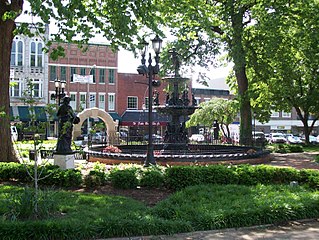
Bowling Green is a home rule-class city and the county seat of Warren County, Kentucky, United States. Founded by pioneers in 1798, Bowling Green was the provisional capital of Confederate Kentucky during the American Civil War. As of the 2020 census, its population of 72,294 made it the third-most-populous city in the state after Louisville and Lexington; its metropolitan area, which is the fourth largest in the state after Louisville, Lexington, and Northern Kentucky, had an estimated population of 179,240; and the combined statistical area it shares with Glasgow has an estimated population of 233,560.

John Hunt Morgan was an American soldier who served as a Confederate general in the American Civil War of 1861–1865.

In the context of the American Civil War (1861–65), the border states were slave states that did not secede from the Union. They were Delaware, Maryland, Kentucky, and Missouri, and after 1863, the new state of West Virginia. To their north they bordered free states of the Union, and all but Delaware bordered slave states of the Confederacy to their south.

The Battle of Perryville, also known as the Battle of Chaplin Hills, was fought on October 8, 1862, in the Chaplin Hills west of Perryville, Kentucky, as the culmination of the Confederate Heartland Offensive during the American Civil War. Confederate Gen. Braxton Bragg's Army of Mississippi initially won a tactical victory against primarily a single corps of Maj. Gen. Don Carlos Buell's Union Army of the Ohio. The battle is considered a strategic Union victory, sometimes called the Battle for Kentucky, since Bragg withdrew to Tennessee soon thereafter. The Union retained control of the critical border state of Kentucky for the remainder of the war.
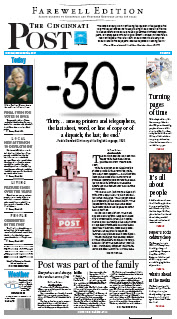
The Cincinnati Post was an afternoon daily newspaper published in Cincinnati, Ohio, United States. In Northern Kentucky, it was bundled inside a local edition called The Kentucky Post. The Post was a founding publication and onetime flagship of Scripps-Howard Newspapers, a division of the E. W. Scripps Company. For much of its history, the Post was the most widely read paper in the Cincinnati market. Its readership was concentrated on the West Side of Cincinnati, as well as in Northern Kentucky, where it was considered the newspaper of record. The Post began publishing in 1881 and launched its Northern Kentucky edition in 1890. It acquired The Cincinnati Times-Star in 1958. The Post ceased publication at the end of 2007, after 30 years in a joint operating agreement with The Cincinnati Enquirer.
The Kentucky Cycle is a series of nine one-act plays by Robert Schenkkan that explores American mythology, particularly the mythology of the West, through the intertwined histories of three fictional families struggling over a portion of land in the Cumberland Plateau. The play won the 1992 Pulitzer Prize for Drama.

Kentucky was a southern border state of key importance in the American Civil War. It officially declared its neutrality at the beginning of the war, but after a failed attempt by Confederate General Leonidas Polk to take the state of Kentucky for the Confederacy, the legislature petitioned the Union Army for assistance. Though the Confederacy controlled more than half of Kentucky early in the war, after early 1862 Kentucky came largely under Union control. In the historiography of the Civil War, Kentucky is treated primarily as a southern border state, with special attention to the social divisions during the secession crisis, invasions and raids, internal violence, sporadic guerrilla warfare, federal-state relations, the ending of slavery, and the return of Confederate veterans.

Louisville in the American Civil War was a major stronghold of Union forces, which kept Kentucky firmly in the Union. It was the center of planning, supplies, recruiting and transportation for numerous campaigns, especially in the Western Theater. By the end of the war, Louisville had not been attacked once, although skirmishes and battles, including the battles of Perryville and Corydon, Indiana, took place nearby.

The Confederate Heartland Offensive, also known as the Kentucky Campaign, was an American Civil War campaign conducted by the Confederate States Army in Tennessee and Kentucky where Generals Braxton Bragg and Edmund Kirby Smith tried to draw neutral Kentucky into the Confederacy by outflanking Union troops under Major General Don Carlos Buell. Though they scored some successes, notably a tactical win at Perryville, they soon retreated, leaving Kentucky primarily under Union control for the rest of the war.

The Confederate government of Kentucky was a shadow government established for the Commonwealth of Kentucky by a self-constituted group of Confederate sympathizers during the American Civil War. The shadow government never replaced the elected government in Frankfort, which had strong Union sympathies. Neither was it able to gain the whole support of Kentucky's citizens; its jurisdiction extended only as far as Confederate battle lines in the Commonwealth, which at its greatest extent in 1861 and early 1862 encompassed over half the state. Nevertheless, the provisional government was recognized by the Confederate States of America, and Kentucky was admitted to the Confederacy on December 10, 1861. Kentucky, the final state admitted to the Confederacy, was represented by the 13th (central) star on the Confederate battle flag.
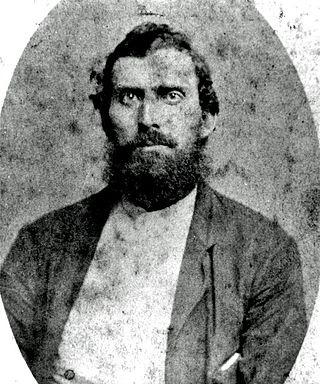
In the United States, Southern Unionists were white Southerners living in the Confederate States of America opposed to secession. Many fought for the Union during the Civil War. These people are also referred to as Southern Loyalists, Union Loyalists, or Lincoln's Loyalists. Pro-Confederates in the South derided them as "Tories". During Reconstruction, these terms were replaced by "scalawag", which covered all Southern whites who supported the Republican Party.

The 2019 Kentucky Attorney General election was conducted on November 5. Primary elections occurred on May 21, 2019. The general election was held on November 5, 2019. Incumbent Democratic Attorney General Andy Beshear declined to seek reelection to a second term to instead successfully run for Governor. Republican nominee Daniel Cameron won with 57.8% of the vote. He became the first Republican elected attorney general of Kentucky since Eldon S. Dummit in 1944, and the state's first black attorney general.

The 2021–22 Kentucky Wildcats men's basketball team represented the University of Kentucky in the 2021–22 NCAA Division I men's basketball season. The Wildcats, founding members of the Southeastern Conference, played their home games at Rupp Arena and were led by John Calipari in his 13th season as head coach. The Wildcats finished the season 26–8, 14–4 in SEC play to finish a tie for second place. As the No. 3 seed in the SEC tournament, they defeated Vanderbilt in the quarterfinals before losing to Tennessee in the semifinals. They received an at large bid to the NCAA tournament as the No. 2 seed in the East region. The Wildcats became just the 10th No. 2 seed to lose in the first round of the NCAA Tournament, losing to No. 15-seeded Saint Peter’s 85–79 in overtime. It also marked the first time Kentucky had suffered a First Round exit under Calipari, and allowed eventual tournament champion Kansas to take the all-time record for most wins in Division I men's college basketball history.





















